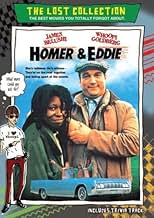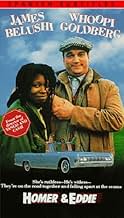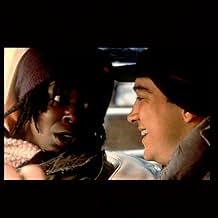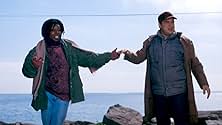VALUTAZIONE IMDb
5,3/10
2133
LA TUA VALUTAZIONE
Aggiungi una trama nella tua linguaA mentally disabled man gets help from a sociopath when he tries to reunite with his dying father, who years earlier disowned him.A mentally disabled man gets help from a sociopath when he tries to reunite with his dying father, who years earlier disowned him.A mentally disabled man gets help from a sociopath when he tries to reunite with his dying father, who years earlier disowned him.
- Premi
- 1 vittoria e 1 candidatura in totale
Jim Belushi
- Homer Lanza
- (as James Belushi)
Jeff Thiel
- Twin #2
- (as Jeffrey Thiel)
Recensioni in evidenza
Though it has been years since I have seen this movie, I remember it with affection and feel compelled to counter the sweeping dismissals of many reviews.
In the bone-hard truth of the desert, humanity is stripped down to persistence, interdependence, and hope and faith in the absence of a visible destination. The road is a trajectory for self-recognition, catharsis, and redemption. And so, just as the desert surprises us with life in the most unexpected places, Homer and Eddie surprise themselves.
Homer and Eddie are not that unlikely a couple. Neither has anywhere to go, figuratively or literally; so they keep on going. Neither has a future to look forward to, and yet each of them harbors hope. They do so because they are still alive, and moving and hoping are as basic to life as breathing. They did not choose each other's company, and they are no less prejudiced towards others for their own low station in society.
Though a road movie, `Homer and Eddie' it is not of the usual sort. Violence here is not redeemed by a `good cause' or an undercurrent of sex appeal; vile speech is not tempered by youth or good looks; and there is no romantic involvement to offer distraction. Homer and Eddie are not Thelma and Louise. They have more in common with Lennie and George in `Of Mice and Men', or with Josué and Dora in `Central Station'. Sidelined by society for crime, poverty, terminal disease and mental disability, Homer and Eddie begin their companionship by default. Eddie reluctantly looks after Homer, like a parent after a stranger's child. As she takes on responsibility for someone more helpless than herself, Eddie senses a reawakening of her capacity to care (in every sense) for another human being and, implicitly, for herself. By defending Homer's human dignity, she recovers her own. Though it will not avert her fate, the experience restores Eddie's humanity.
I found the film empowering because it takes its protagonists and their situation seriously. Homer and Eddie are not innocent. Nor are their shortcomings dismissible as picturesque, colorful, or cute. They don't try to be lovable; they simply are who they are. Their humor is that of people who believe they have nothing to lose. The film's perspective is level and from the inside out, not from the lofty perch of mainstream society. In that sense, it isn't judgmental, either, and so allows us to empathize with its outcasts. Their heroism is in their refusal to be victims, and in rising above their situation against all odds. This quiet and remarkably subtle piece is some of the best I have seen of Hollywood, and the tears I cried were those of joy and relief: No matter how low you sink in life, it is never too late to be a worthy human being.
In the bone-hard truth of the desert, humanity is stripped down to persistence, interdependence, and hope and faith in the absence of a visible destination. The road is a trajectory for self-recognition, catharsis, and redemption. And so, just as the desert surprises us with life in the most unexpected places, Homer and Eddie surprise themselves.
Homer and Eddie are not that unlikely a couple. Neither has anywhere to go, figuratively or literally; so they keep on going. Neither has a future to look forward to, and yet each of them harbors hope. They do so because they are still alive, and moving and hoping are as basic to life as breathing. They did not choose each other's company, and they are no less prejudiced towards others for their own low station in society.
Though a road movie, `Homer and Eddie' it is not of the usual sort. Violence here is not redeemed by a `good cause' or an undercurrent of sex appeal; vile speech is not tempered by youth or good looks; and there is no romantic involvement to offer distraction. Homer and Eddie are not Thelma and Louise. They have more in common with Lennie and George in `Of Mice and Men', or with Josué and Dora in `Central Station'. Sidelined by society for crime, poverty, terminal disease and mental disability, Homer and Eddie begin their companionship by default. Eddie reluctantly looks after Homer, like a parent after a stranger's child. As she takes on responsibility for someone more helpless than herself, Eddie senses a reawakening of her capacity to care (in every sense) for another human being and, implicitly, for herself. By defending Homer's human dignity, she recovers her own. Though it will not avert her fate, the experience restores Eddie's humanity.
I found the film empowering because it takes its protagonists and their situation seriously. Homer and Eddie are not innocent. Nor are their shortcomings dismissible as picturesque, colorful, or cute. They don't try to be lovable; they simply are who they are. Their humor is that of people who believe they have nothing to lose. The film's perspective is level and from the inside out, not from the lofty perch of mainstream society. In that sense, it isn't judgmental, either, and so allows us to empathize with its outcasts. Their heroism is in their refusal to be victims, and in rising above their situation against all odds. This quiet and remarkably subtle piece is some of the best I have seen of Hollywood, and the tears I cried were those of joy and relief: No matter how low you sink in life, it is never too late to be a worthy human being.
This is easily the "craziest" Road Movie ever made - and one of the best. It's funny, tragic, dramatic and intelligent. Konchalovsky's composition is without any flaws - you'll find no plot holes or boring sequences destroying the flow of the story. The soundtrack supports the atmosphere of the movie perfectly. James Belushi stars as Homer, a retarded man, who goes on a long journey to see his dying father. Right at the start he's being robbed of all his cash and has to sleep in a car cemetery. There he meets the criminal Eddie, played by Whoopi Goldberg, who's slowly dying of a brain tumor. This tumor is the reason for several violent outbreaks. Eddie escorts Homer and arranges the first sexual contact for him - with a monstrous prostitute. This results in one of the most charming and funny "sex scenes" I've ever seen, beaten only by the priceless dancing scenes with Homer and Eddie at the pier. I've never seen one of the two acting better. But don't miss the guest appearances of Anne Ramsey, Karen Black and Jesus! And be warned: even though this film is full of funny, charming and lovable scenes it has also its violent parts.
If you liked "Harold & Maude" and "Gilbert Grape" this is a film for you!
If you liked "Harold & Maude" and "Gilbert Grape" this is a film for you!
I don't know what all the dissing is for! This is a great film, although I would've picked different music for the soundtrack. Entertaining...funny...heart and soul. What more could you ask for? Whoopi's best performance next to The Color Purple...
Whoopi Goldberg-James Belushi road movie isn't very good, isn't well-directed, but it does have something. Wrongly advertised as a wacky comedy, "Homer and Eddie" is actually a surprisingly sensitive and light-on-its-feet drama about friendship. Mentally backward man (Belushi) partners with an escaped mental patient named Eddie (Goldberg) who also has a brain tumor and keeps thinking she sees Jesus going by. Sort of a tragic love story between two unfortunate people that life threw away. Both stars are just fine, but the sloppy editing shows signs of an indecisive captain of the ship, and the blue-collar rock music on the soundtrack is grating. Panned by the critics, I found several scenes between the leads to be moving and funny, and Belushi shows a wonderfully huggable side of himself with a lovely monologue at a funeral; this is his best performance to date. **1/2 from ****
I am a real big fan of both Whoopi Goldberg and James Belushi. However I was real disappointed in this movie. I guess I won't discuss it and ruin it for someone else. I would love the opportunity to rip this movie to shreds, I really hated it. anyone finding the reason to like this movie- please email me!!! Maybe you can show me something I missed. I felt Whoopi's character was overly violent and harsh. I felt the guy who walks through the background of several scenes ( I won't reveal anything there) belonged in an avant garde film, foreign film, anywhere but there. The script,... well, I won't go on. Comments welcome.
Lo sapevi?
- QuizBest buddies in this movie, Whoopi Goldberg and Jim Belushi previously appeared as rivals in Jumpin' Jack Flash (1986).
- BlooperWhen Eddie spots the red car at the produce stand and tells Homer to pull in there, she is in the back seat. After they pull in they show her sitting in the front seat.
- Citazioni
Eddie Cervi: Feelin' pretty good? Then let's go!
- Colonne sonoreDown Home Jubilee
Performed by Susi Beatty
Written by Dennis Morgan, Spady Brannan & Susi Beatty
Produced by David Malloy
Courtesy of Little Shop of Morgansongs/Spady Music/S.G.P. LTD
I più visti
Accedi per valutare e creare un elenco di titoli salvati per ottenere consigli personalizzati
- How long is Homer and Eddie?Powered by Alexa
Dettagli
- Tempo di esecuzione1 ora 40 minuti
- Colore
- Mix di suoni
- Proporzioni
- 1.85 : 1
Contribuisci a questa pagina
Suggerisci una modifica o aggiungi i contenuti mancanti

Divario superiore
By what name was Homer & Eddie (1989) officially released in Canada in English?
Rispondi
































